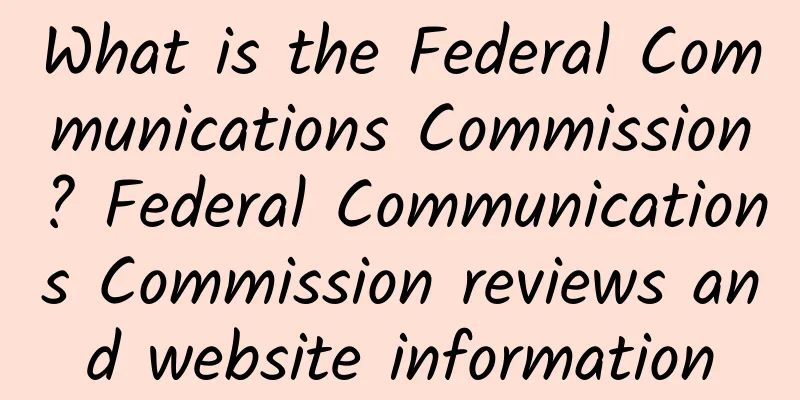What is the Federal Communications Commission? Federal Communications Commission reviews and website information

|
What is the Federal Communications Commission? The Federal Communications Commission (FCC) is an independent government agency in the United States that is directly responsible to Congress. It was created by the COMMUNICATION ACT in 1934 and is mainly responsible for coordinating domestic and international communications in the United States, including televisions, wires, satellites, cables, etc. Website: www.fcc.gov The Federal Communications Commission (FCC) is an important agency of the US government, responsible for regulating and managing the communications business in the United States. As an independent government agency, the FCC is directly responsible to Congress, and its mission is to ensure fair competition in the communications field, protect consumer rights, and promote innovation and technological development. The establishment of the FCC can be traced back to 1934, when the US Congress passed the Communications Act, which aims to regulate and manage the increasingly complex communications industry and ensure its healthy development. The FCC has a wide range of responsibilities, covering television, radio, cable television, satellite communications, wireless communications, the Internet and other fields. It not only manages domestic communications business, but also coordinates international communications affairs to ensure the influence of the United States in the global communications field. The main tasks of the FCC include spectrum management, issuing communications licenses, formulating communications policies, protecting consumer rights and promoting the innovation and application of communications technology. FCC HistoryThe establishment of the FCC can be traced back to the early 20th century, when the communications industry in the United States was in a stage of rapid development. The emergence of new technologies such as radio broadcasting, telephone and telegraph made the communications industry increasingly complex. In response to this change, the US government realized the need to establish a specialized agency to manage and regulate the communications industry. In 1934, the US Congress passed the Communications Act and formally established the Federal Communications Commission (FCC). Since its inception, the FCC has played an important role in the development of the communications industry. For most of the 20th century, the FCC was primarily responsible for regulating traditional media such as radio, television, and cable television. With the rise of the Internet and wireless communications technology, the FCC's responsibilities have gradually expanded to include Internet management, spectrum allocation, wireless communications technology, and other fields. FCC Organizational StructureThe FCC's organizational structure consists of five main parts, namely the Commission, Chairman, Office, Bureau, and Office. The Commission is the highest decision-making body of the FCC and consists of five commissioners, one of whom is appointed as the Chairman. Commissioners are nominated by the President and appointed after confirmation by the Senate, and their terms are usually five years. The Chairman is responsible for leading the day-to-day work of the FCC and communicating with Congress, the White House, and other government agencies on behalf of the FCC. The FCC has several bureaus and offices, each responsible for a different area of communications. For example, the Media Bureau is responsible for the management of radio, television, and cable television; the Wireless Bureau is responsible for wireless communications technology and spectrum management; the Cable Competition Bureau is responsible for cable communications and Internet management; and the Enforcement Bureau is responsible for enforcing communications regulations and handling violations. In addition, the FCC also has several offices, such as the Office of Consumer and Government Affairs, the Office of Engineering and Technology, etc., which provide support for the FCC's various tasks. FCC's Responsibilities and FunctionsThe FCC's main responsibilities are to ensure fair competition in the U.S. communications industry, protect consumer rights, and promote technological innovation. Specifically, the FCC's responsibilities include the following:
The FCC's Role in International CommunicationsThe FCC not only plays an important role in the United States, but also in international communications affairs. As the communications management agency of the U.S. government, the FCC is responsible for communicating and coordinating with other countries and international organizations to ensure the United States' influence in the field of international communications. The FCC participates in international spectrum management, international communications standards formulation, cross-border communications coordination and other work to promote the development of the global communications industry. For example, in terms of international spectrum management, the FCC cooperates with the communications management agencies of other countries to ensure the rational allocation and utilization of global spectrum resources. In terms of international communications standard formulation, the FCC actively participates in the work of international organizations such as the International Telecommunication Union (ITU) to promote the formulation and implementation of international communications standards. In terms of cross-border communications coordination, the FCC cooperates with the communications management agencies of other countries to solve technical and management problems in cross-border communications and ensure the smooth operation of communications services. FCC's Challenges and FutureAlthough the FCC plays an important role in the management and regulation of the communications industry, it also faces many challenges. With the rapid development of communications technology, the FCC needs to constantly adapt to new technologies and market changes. For example, the promotion of 5G technology, the popularization of the Internet, and the application of artificial intelligence have all put forward new requirements for the FCC's management capabilities. In addition, the FCC also needs to face various pressures from the industry and society. Competition in the communications industry is becoming increasingly fierce. In order to compete for market share, major companies often use various means, which puts higher demands on the FCC's regulatory capabilities. At the same time, consumers' requirements for communications services are also getting higher and higher. The FCC needs to find a balance between protecting consumer rights and promoting industry development. In the future, the FCC will continue to play an important role in the management and regulation of the communications industry. With the continuous advancement of technology and the continuous changes in the market, the FCC needs to continue to innovate and adjust its management strategies to adapt to new challenges and opportunities. The FCC will continue to be committed to promoting the development of the communications industry, protecting consumer rights, promoting technological innovation, and ensuring the United States' leadership in the global communications field. FCC official websiteThe FCC's official website (www.fcc.gov) is an important channel for the public to understand the FCC's work and policies. Through this website, the public can obtain the FCC's latest news, policies and regulations, license application procedures, consumer complaint handling and other information. In addition, the FCC's official website also provides a variety of online tools and resources to help the public better understand and use communication services. In short, as an important agency of the US government, the Federal Communications Commission (FCC) plays an important role in the management and regulation of the communications industry. Whether it is spectrum management, license issuance, policy formulation, consumer rights protection, or technological innovation promotion, the FCC has made important contributions to the development of the US communications industry. With the continuous advancement of communications technology, the FCC will continue to play an important role in the future communications industry. |
<<: How is Cottds Fashion Blog? Cottds Fashion Blog Review and Website Information
>>: What is the Ig Nobel Prize? Ig Nobel Prize review and website information
Recommend
The efficacy and function of Zizhenxiang grapes
Do you know the Purple Zhenxiang grape? It is a g...
How to squeeze banana juice How to squeeze banana juice to make it delicious
Banana is a common fruit that people often eat. I...
How is Meco-Med milk powder? Meco-Med milk powder reviews and website information
What is Maxigenes milk powder? Maxigenes is an Aus...
The efficacy and function of shredded radish soup
Shredded radish soup is a delicious and healthy s...
Huangyan tangerine planting and knowledge introduction
Introduction to Mandarin Orange Citrus is the mos...
What is Best House Design like? Best House Design reviews and website information
What is Best House Design? Best House Design is a ...
The efficacy and function of bergamot and how to eat bergamot
Bergamot is the mature fruit of the Rutaceae plan...
The benefits and disadvantages of vinegar for skin Vinegar's effects and functions
Many people who love beauty in life have heard th...
How to grow hydrangeas? How to grow hydrangeas and what to pay attention to
Hydrangea is a beautiful ornamental plant named a...
How to cut jackfruit How to peel jackfruit Tips
It is not an exaggeration to say that jackfruit i...
How is Nissan? Nissan reviews and website information
What is Nissan? Nissan Motor Co., Ltd. is a Japane...
What are the benefits of drinking mint water for women? What are the harms of drinking mint water for a long time?
Mint is a very common green herb in life. It can ...
The benefits of eating turtle blood How to eat turtle blood
Turtle is a nourishing food that many people love...
Effects and efficacy of angelica mushroom chicken soup
In southern China, people like to cook angelica m...
What fruit is the best for replenishing blood? The king of blood-replenishing fruits
When the body's qi and blood are deficient, t...









